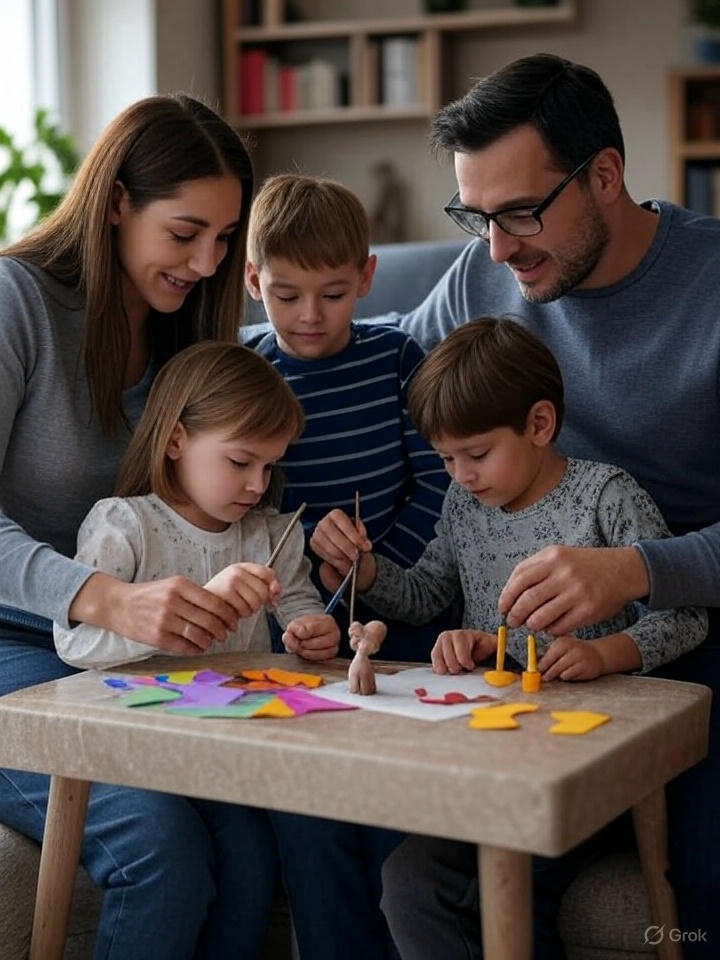Building strong bonds within a family is crucial for fostering a supportive and loving environment.
When family members feel connected, they are more likely to communicate openly, trust each other, and provide emotional support during difficult times.
One effective method for strengthening family bonds is by spending quality time together.
This can involve participating in shared activities such as hiking, playing board games, or cooking meals as a group. These experiences create lasting memories and reinforce relationships among family members. Another approach to building strong family bonds is through expressing gratitude and appreciation for one another.
Acknowledging and thanking family members for their contributions and support helps cultivate a sense of belonging and unity. Furthermore, demonstrating empathy and understanding towards each other’s feelings and experiences contributes to a supportive and nurturing family environment. By establishing strong bonds within the family unit, individuals can experience increased feelings of security and connectedness, which can lead to improved overall well-being.
Key Takeaways
- Building strong bonds with your children is essential for their emotional well-being and development.
- Stress relief and coping mechanisms can be taught to children through various activities and communication.
- Fostering communication and connection with your children helps in building trust and understanding.
- Teaching resilience and adaptability to children is important for their future success and happiness.
- Promoting positive parenting techniques creates a nurturing and supportive environment for children to thrive in.
- Creating happy memories with your children strengthens the bond and creates a positive foundation for their emotional health.
- Strengthening emotional health in children is crucial for their overall well-being and ability to handle life’s challenges.
Stress Relief and Coping Mechanisms
Family Activities for Stress Relief
Engaging in activities together as a family, such as exercise or relaxation techniques, can help reduce stress levels and promote overall well-being. This can include activities like yoga, meditation, or simply spending quality time together.
Open Communication: A Key to Emotional Healing
Open and honest communication within the family is crucial during difficult times. By sharing feelings and experiences with one another, family members can feel understood and supported, which can help alleviate stress and promote emotional healing.

Seeking Professional Help as a Family
Seeking professional help as a family when needed can also serve as an effective coping mechanism during challenging times. By providing a supportive and nurturing environment, families can serve as a valuable source of stress relief and coping mechanism for their members.
Fostering Communication and Connection
Fostering communication and connection within the family is essential for creating a supportive and harmonious environment. Open and honest communication allows family members to express their thoughts, feelings, and concerns, which can help strengthen relationships and promote understanding. By actively listening to one another and validating each other’s experiences, family members can feel heard and supported, leading to improved communication and connection.
In addition to verbal communication, non-verbal forms of communication, such as body language and gestures, can also play a significant role in fostering connection within the family. By being attentive to non-verbal cues and expressions, family members can better understand each other’s emotions and needs, leading to improved connection and empathy. Furthermore, engaging in activities that promote teamwork and collaboration, such as problem-solving tasks or creative projects, can also foster communication and connection within the family.
By fostering communication and connection, families can create a supportive and harmonious environment where individuals feel understood and valued.

Teaching Resilience and Adaptability
Teaching resilience and adaptability within the family is essential for helping individuals navigate life’s challenges and uncertainties. By encouraging family members to develop problem-solving skills, positive coping strategies, and a growth mindset, families can help promote resilience and adaptability. This can include teaching children how to overcome obstacles, manage stress, and bounce back from setbacks, which can help them develop the skills needed to thrive in the face of adversity.
Furthermore, modeling resilience and adaptability as parents can also have a significant impact on children’s development. By demonstrating how to effectively cope with challenges and setbacks, parents can teach their children valuable life skills that will serve them well in the future. Additionally, providing a supportive and nurturing environment where individuals feel safe to take risks and learn from their experiences can also help promote resilience and adaptability within the family.
By teaching resilience and adaptability, families can help individuals develop the skills needed to navigate life’s challenges with confidence and determination.
Promoting Positive Parenting
Promoting positive parenting within the family is essential for creating a nurturing and supportive environment for children to thrive. Positive parenting involves using effective discipline strategies, providing emotional support, setting clear expectations, and fostering open communication with children. By promoting positive parenting practices, families can help children develop self-esteem, resilience, and healthy relationships with others.
One way to promote positive parenting within the family is by using positive reinforcement to encourage good behavior in children. This can include praising children for their efforts, acknowledging their achievements, and providing rewards for positive behavior. Additionally, setting clear boundaries and expectations for children’s behavior can also promote positive parenting within the family.
By establishing consistent rules and consequences for behavior, parents can help children develop self-discipline and respect for others. Furthermore, providing emotional support and validation for children’s feelings and experiences is also essential for promoting positive parenting within the family. By being empathetic and understanding towards children’s emotions, parents can help children feel heard and supported, which can promote healthy emotional development.
By promoting positive parenting practices within the family, parents can create a nurturing and supportive environment where children feel safe to explore their potential and thrive.
Creating Happy Memories
Preserving Happy Memories
Additionally, capturing these happy memories through photographs or keepsakes can help preserve these special moments for years to come. Looking back on these memories can evoke feelings of nostalgia and happiness, which can help strengthen family connections and promote emotional well-being.
The Power of Shared Experiences
Furthermore, sharing stories about these happy memories with one another can also help create a sense of closeness and connection within the family. By reliving these special moments together, family members can deepen their emotional bonds and foster a sense of unity.
Strengthening Relationships Through Joy
By creating happy memories together as a family, individuals can experience joy and fulfillment while strengthening their relationships with one another. These positive experiences can have a lasting impact on family dynamics, promoting a sense of love, support, and togetherness.
Strengthening Emotional Health
Strengthening emotional health within the family is essential for promoting overall well-being and resilience. By providing a supportive environment where individuals feel safe to express their emotions and seek help when needed, families can help promote emotional health for their members. This can include encouraging open communication about feelings, providing emotional support during challenging times, and seeking professional help when necessary.
In addition to providing emotional support, promoting healthy lifestyle habits within the family can also contribute to strengthening emotional health. This can include engaging in regular physical activity together as a family, eating nutritious meals, getting enough sleep, and managing stress effectively. By promoting healthy lifestyle habits within the family, individuals can experience improved emotional well-being and resilience.
Furthermore, fostering a sense of belonging and connection within the family can also contribute to strengthening emotional health. By creating a supportive environment where individuals feel understood and valued, families can help promote emotional well-being for their members. Additionally, seeking professional help when needed for mental health concerns is also essential for strengthening emotional health within the family.
By prioritizing emotional health within the family, individuals can experience improved overall well-being and resilience. In conclusion, building strong bonds within the family is essential for creating a supportive environment where individuals feel connected and valued. By promoting positive parenting practices, fostering communication and connection, teaching resilience and adaptability, creating happy memories, promoting stress relief and coping mechanisms, families can help strengthen emotional health for their members.
By prioritizing emotional health within the family, individuals can experience improved overall well-being while fostering positive relationships with one another.
FAQs
What is the importance of humor in a healthy family?
Humor plays a crucial role in promoting bonding, reducing stress, and creating a positive atmosphere within a family. It helps family members to connect, communicate, and cope with challenges in a lighthearted manner.
How does humor benefit family relationships?
Humor can strengthen family relationships by fostering a sense of togetherness, enhancing communication, and creating joyful memories. It also helps family members to navigate conflicts and difficult situations with a lighter perspective.
What are the effects of humor on family dynamics?
Humor can improve family dynamics by promoting empathy, understanding, and resilience. It can also help in diffusing tension, promoting forgiveness, and creating a supportive and nurturing environment within the family.
How can families incorporate humor into their daily lives?
Families can incorporate humor into their daily lives by sharing jokes, playing lighthearted games, and engaging in playful activities together. They can also create a culture of laughter and positivity by finding humor in everyday situations and embracing a light-hearted approach to life.
Can humor help in dealing with family challenges?
Yes, humor can be a valuable tool in helping families to navigate through challenges and adversity. It can provide a coping mechanism, reduce stress, and offer a fresh perspective on difficult situations, thereby promoting resilience and emotional well-being.
What is your funniest memory from your childhood?
Share your funny story or memory below. We’d love to hear what you found funny as a child.

